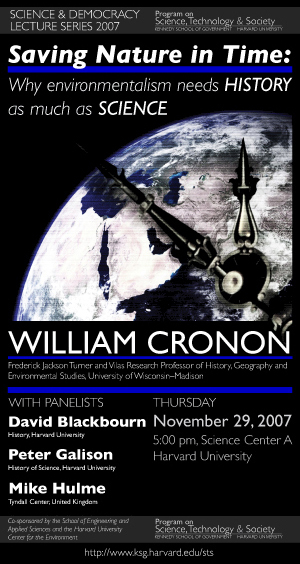Program on Science, Technology and Society at HarvardHarvard Kennedy School of Government | Harvard University |
|||||||
|
|
Saving Nature in Time: Why Environmentalism Needs History as much as ScienceWilliam CrononFrederick Jackson Turner and Vilas Research Professor of History, Geography and Environmental Studies, University of Wisconsin–Madison November 29, 2007, 5:00pm-7:00pm AbstractIn this lecture drawn from a book of the same title that he is currently completing, William Cronon analyzes key cultural assumptions about humanity and nature that have characterized modern environmental thinking in the United States for the past several decades, in an effort to understand how these have sometimes undermined the effectiveness of environmentalism as a political, social, and cultural movement. His goal will be to try to imagine how environmentalism might be more effective if is followers did a better job of mingling the natural and the cultural in the service of humane values. Video of this lecture is located here. PanelDavid BlackbournHistory, Harvard University Peter GalisonHistory of Science, Harvard University Mike HulmeTyndall Center, United Kingdom About the speakerWilliam Cronon is the Frederick Jackson Turner Professor of History, Geography, and Environmental Studies and Vilas Research Professor at the University of Wisconsin-Madison. Previously he taught for more than a decade in the Yale History Department. Cronon's research examines the history of human interactions with the natural world: how we depend on the ecosystems around us, how we modify the landscapes in which we live and work, and how our ideas of nature shape our relationships with the world. His influential first book, Changes in the Land: Indians, Colonists, and the Ecology of New England (1983), was a study of how the New England landscape changed as control of the region shifted from Indians to European colonists. It won the 1984 Francis Parkman Prize of the Society of American Historians. His prize-winning 1991 book entitled Nature's Metropolis: Chicago and the Great West examines Chicago's relationship to its rural hinterland during the second half of the nineteenth century. In 1992, it was one of three nominees for the Pulitzer Prize in History. He is also the editor of an influential collection of essays entitled Uncommon Ground: Rethinking the Human Place in Nature(1995), examining the implication of different cultural ideas of nature for modern environmental problems. Cronon has been a Rhodes Scholar, Danforth Fellow, Guggenheim Fellow, and MacArthur Fellow. He is a member of the American Philosophical Society and a Fellow of the Wisconsin Academy of Sciences, Arts and Letters as well as the American Academy of Arts and Sciences. Co-sponsored by the School of Engineering and Applied Sciences and the Harvard University Center for the Environment. VideoThis short excerpt from the event was edited by William Firestone. |
||||||
